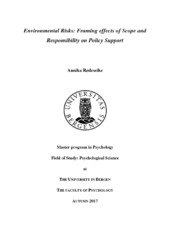Environmental Risks: Framing effects of Scope and Responsibility on Policy Support
Abstract
The nature of global environmental risks (e.g. climate change) are often complex and thereby difficult to understand through human sensory reception. The perception of these risks will therefore often come from communications from experts and the public discourse. How people evaluate this communication, and how they act in associated decision-making processes are crucial because is leads to environmentally relevant behaviour. The present study examined the effect of framing (psychological distance and moral responsibility) of messages about environmental risks on environmentally relevant policy support. Using an experimental design, 183 participants were randomly assigned into one of four conditions in two fictitious environmental risk scenarios: a local risk with a focus on collective moral responsibility (N= 32), a global risk with a focus on collective moral responsibility (N = 53), a local risk with an individual focus on moral responsibility (N = 52), or a global risk with a focus on individual moral responsibility (N = 49). The results showed no effect of framing on policy support, but all the included types of policy supports were predictable from values (biospheric, altruistic and egoistic) and emotions (ethic related and consequence related). This indicates that framing of the type used in this experiment, do not affect people’s moral considerations in relation to environmental risk related policies. Globale miljørisikoer er ofte komplekse av natur, og følgelig vanskelige å forstå gjennom menneskelig persepsjon. Oppfatningen av denne type risiko vil derfor ofte komme fra kommunikasjon fra eksperter og den offentlige diskurs. Hvordan folk evaluerer denne kommunikasjonen, og hvordan de responderer i tilknyttede beslutningsprosesser er avgjørende fordi det fører til ulike typer miljøatferd. Dette studiet undersøkte effekten av innramming (psykologisk avstand og moralsk ansvar) av budskap om miljørisiko på miljøpolitisk støtte. Gjennom å bruke et eksperimentelt design, ble 183 deltakere tilfeldig tildelt én av fire scenario i to ulike fiktive miljørisikoscenarier: en lokal risiko med fokus på kollektivt moralsk ansvar (N = 32), en global risiko med fokus på kollektivt moralsk ansvar (N = 53), en lokal risiko med et individuelt fokus på moralsk ansvar (N = 52), eller en global risiko med fokus på individuelt moralsk ansvar (N = 49). Resultatene viste ingen innvirkning av innramming på politisk støtte, men alle inkluderte typer miljøpolitisk støtte var mulig å predikere gjennom verdier (biosfæriske, altruistiske og egoistiske) og emosjoner (etisk relaterte og konsekvens relaterte). Dette indikerer at innramming av typen som ble brukt i dette eksperimentet, ikke påvirker folks moralske hensyn i forhold til ulike typer miljøpolitisk støtte.
